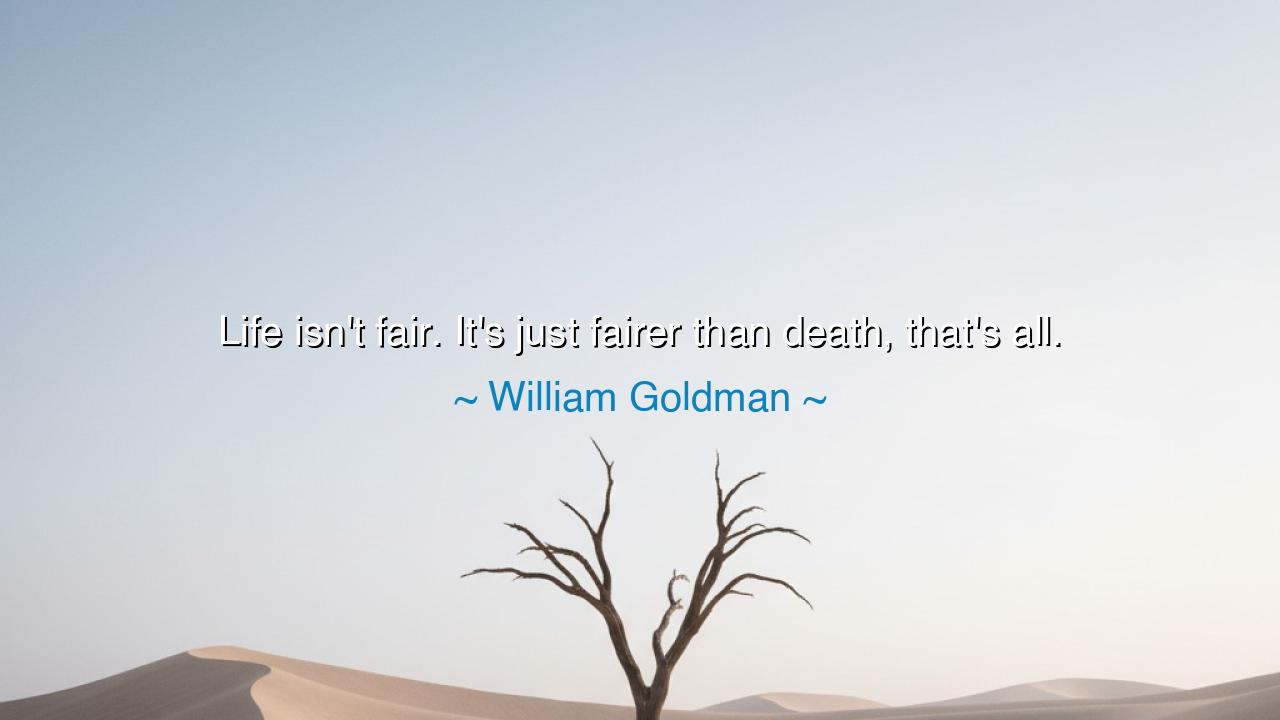
Life isn't fair. It's just fairer than death, that's all.






“Life isn’t fair. It’s just fairer than death, that’s all.” — thus spoke William Goldman, the storyteller whose pen wove The Princess Bride and other tales that mingled laughter with truth. His words, though cloaked in wit, strike like the ancient hammer of wisdom upon the anvil of the human heart. For in this line lies the timeless understanding that life, though unjust, uncertain, and full of sorrow, remains a gift — a fragile flicker of light against the vast darkness of death. Goldman does not offer comfort, but clarity. He teaches that the measure of existence is not fairness, but presence — not perfection, but the chance to live, to love, to suffer, and to continue.
To the wise, this truth is as old as time. The ancients spoke of fate — Moirae, the Fates of Greece — three sisters who spun, measured, and cut the thread of every life. No man could plead fairness before them; no king nor beggar could escape their decree. Yet the philosophers of old, from Heraclitus to Marcus Aurelius, taught that to live with awareness of fate is not to despair, but to awaken. For though the world is indifferent to our pain, the fact that we can feel, think, and act at all is itself a miracle. Life may not be fair — storms strike the just and unjust alike — but death is final, and so long as breath remains, there is still the sacred possibility of change.
Goldman’s words, born from his wry and observant spirit, carry a modern echo of this ancient philosophy. In his stories, the world is often absurd, filled with irony and injustice — yet always laced with humor and humanity. His characters suffer betrayal, loss, and failure, yet they persevere because that is what living demands. His quote does not lament the cruelty of existence; it celebrates its resilience. When he says life is “fairer than death,” he reminds us that even in pain, there is motion; even in failure, there is growth. The dead do not dream. The living, however burdened, may still rise.
History, too, bears witness to this truth. Consider the tale of Viktor Frankl, the psychiatrist and survivor of the Nazi concentration camps. In the darkest place on earth, he learned the same lesson Goldman distilled into a single line: that life owes us nothing, yet we owe everything to life. Surrounded by death, stripped of dignity and freedom, Frankl discovered that meaning could still be found — in memory, in love, even in suffering. He wrote, “Those who have a ‘why’ to live can bear almost any ‘how.’” Life was not fair to him, nor to the millions who perished — but for those who survived, every sunrise, every breath, was still a form of grace.
The ancients would have called this understanding acceptance of the order of things — what the Stoics named amor fati, the love of one’s fate. To love life not because it is kind, but because it is real; to embrace existence even when it wounds; to see in every struggle a reminder that we are still part of the divine motion of being. Goldman's humor thus becomes a shield — not to deny suffering, but to face it with courage and irony. It is a laughter born not of ignorance, but of wisdom — the laughter of one who knows the fragility of all things and still chooses to smile.
In truth, his quote offers a quiet call to humility. Too often, we demand fairness from life as if we were its masters, forgetting that we are its guests. The rain falls unevenly; some harvests fail, others flourish. But to live — even for a day — is to stand under the same sun that once warmed the ancients, to breathe the same air that carried their prayers. That is not fairness, but blessing. The wise man, therefore, does not curse the unevenness of the world; he rejoices that he is still part of its rhythm.
So, my listener, take this teaching to heart: life will not give you justice, but it will give you time. Use that time wisely. Work, love, create, forgive — not because life is fair, but because it is fleeting. When hardship comes, remember Goldman’s jest, and let it steel your spirit: if life is unfair, it is still better than the silence that follows. For while you breathe, there remains hope — the hope to begin again, to mend, to build. Death ends the story, but life — however imperfect — lets us write another page. And that, as William Goldman reminds us, is the fairest gift of all.






AAdministratorAdministrator
Welcome, honored guests. Please leave a comment, we will respond soon